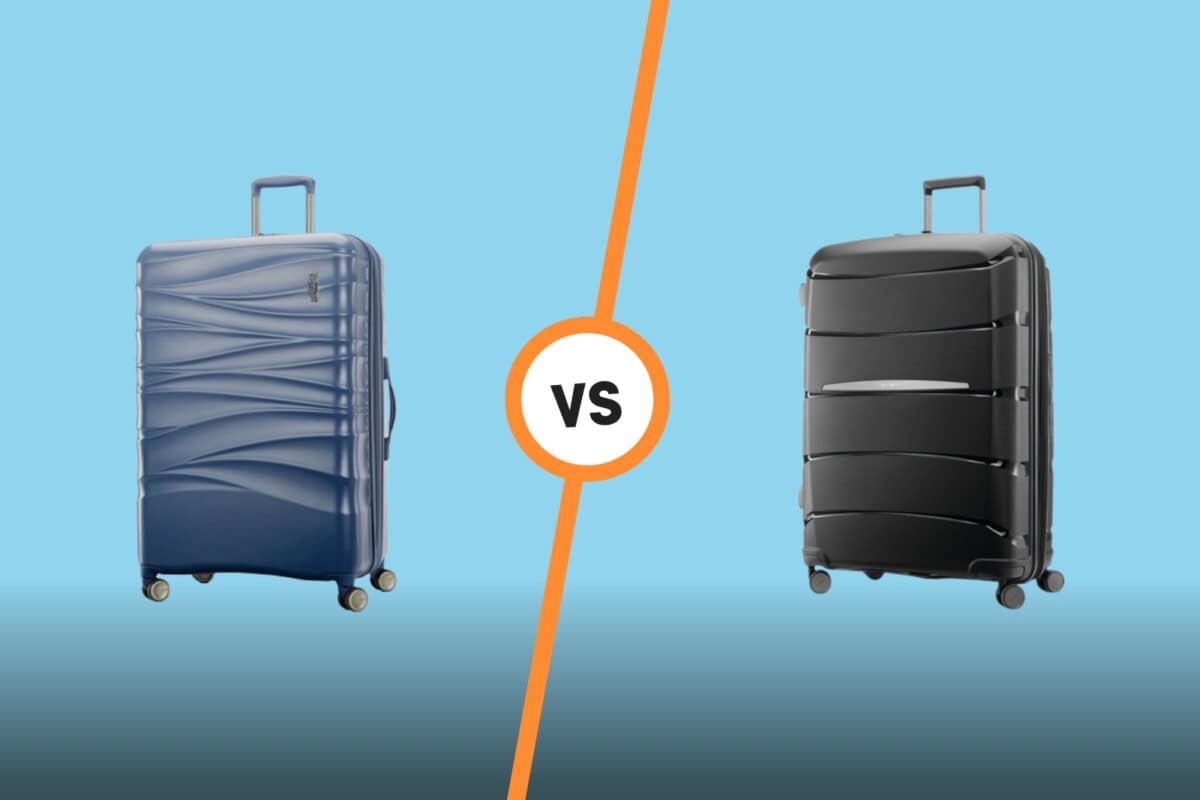
American Tourister and Samsonite offer unique benefits and cater to different types of travelers. But which one suits your journey best?
As a seasoned traveler who’s lived out of a suitcase for months at a time, I’ve put my luggage through every conceivable test. Over the years, I’ve zipped and unzipped, packed and repacked, and rolled dozens of suitcases across multiple continents. My hands-on experience with both American Tourister and Samsonite means I can offer insights not just from product specs, but from real-world durability and functionality.
Plus, in 15 years of testing, the TravelFreak team has rated over 150 suitcases using our comprehensive data-based methodology. We’ve spent years honing our expertise in the field and learning what makes the difference between a good suitcase and a great one.
What you may not know is that American Tourister is actually owned by the Samsonite Corporation. However, just because the two brands are made by the same company doesn’t mean they are equivalent. American Tourister is sold as the more budget-friendly alternative to Samsonite, which means cheaper materials, simpler designs, and fewer high-end options.
And that’s the key difference. If you’re looking for a decent suitcase on the cheap, American Tourister has you covered. If you are willing to spend a bit more for higher-quality luggage, Samsonite is better.
It’s not necessarily as simple as just picking a price point, though. I’ll share my experiences with both brands and help you understand the exact trade offs you can expect between them.
Why You Can Trust Us
The TravelFreak editorial team has tested dozens of suitcases over the years, and we’ve learned a lot about what separates a quality piece of luggage from an overpriced, overhyped piece of plastic. We’ve tested and reviewed budget luggage, luxury suitcases, and everything in between.
We know how hard it is to find the perfect suitcase, and we want to make the process easier for you. So our team of gear junkies and product engineers developed the most comprehensive luggage test methodology possible.
We tested and rated 5 American Tourister suitcases and 15 Samsonite suitcases, including carry-ons and checked bags from both brands.
We evaluated every one of these suitcases on 31 metrics across eight categories. We gave them all the same treatment and rated them on the same standardized scales. This makes it easy for us (and you) to compare the advantages and disadvantages of each.
At a Glance
American Tourister vs Samsonite: Quick Answers
- Durability: Monos luggage is generally more durable and well-built overall.
- Price: American Tourister is a budget brand with very low prices. Samsonite is more expensive overall and has more premium models.
- Warranty: American Tourister and Samsonite have a virtually identical 10-year limited warranty.
- Sustainability: Samsonite is much better if you prioritize sustainability. They use recycled materials and have programs to reduce their energy consumption and carbon footprint.
- Materials: American Tourister uses cheap materials like ABS on most of their suitcases. Samsonite uses a wide range of materials, including more durable options like polycarbonate.
- Design and Style: American Tourister luggage is colorful and flashy with fun print designs. Samsonite luggage is more understated and professional.
- Interior Organization: American Tourister suitcases are very simple and bare-bones inside, while Samsonite has designs with more internal pockets and organization features.
- Expandability: Both American Tourister and Samsonite have suitcases that can expand.
- Wheels: American Tourister generally uses flimsier single spinner wheels, while many Samsonite models have stronger double spinner wheels.
- Telescopic Handle: Samsonite luggage generally has stronger and more adjustable handles than American Tourister.
- Color Options: American Tourister luggage comes in a huge range of bright colors and designs, while Samsonite’s color choices are more limited.
American Tourister vs Samsonite: Which Should You Buy?
Buy American Tourister if you…
- are on a tight budget.
- don’t travel frequently.
- mainly take domestic flights within the US.
- need luggage for summer vacations or cruises.
- are buying luggage for a child or for traveling with a family.
Buy Samsonite if you…
- travel more frequently.
- often travel internationally.
- travel for work.
- want a suitcase that will last for years of travel.
- care about buying more sustainable travel gear.
- need checked luggage for long-haul trips.
Materials & Quality
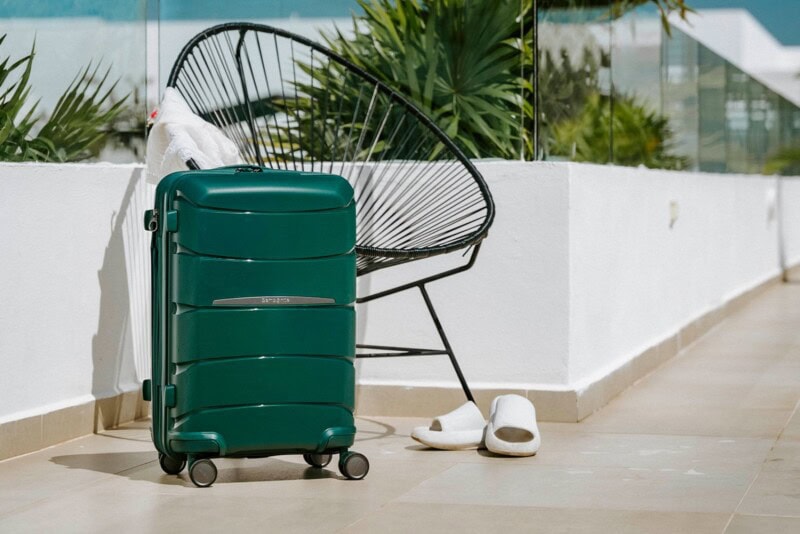
American Tourister is solidly a budget brand, and that means you shouldn’t expect the same quality and durability you’d get from a high-end brand like Briggs & Riley (which is one of the best luggage brands out there).
Now, don’t get me wrong. An American Tourister bag will survive long plane rides and bumpy baggage carousels just fine, and if you use it right, it could last for years of travel. But choosing American Tourister over Samsonite does come with some tradeoffs.
Here’s what I mean.
Most American Tourister hardside suitcases are made with ABS plastic. This is one of the most common plastics on the planet; it’s used in everything from LEGOs to vacuum cleaners to your laptop’s keyboard. It’s a decent material all-around, but it’s less than ideal for luggage.
The multi-directional spinner wheels, zippers, and handles are also cheaper and flimsier than the ones Samsonite luggage uses.
Because Samsonite has such a wide range of products, they use a lot of different materials. Their cheaper hardside suitcases are made of polypropylene, which is lightweight and flexible. It’s generally better than ABS, but it is still a budget material, and isn’t particularly sturdy.
For a little more money, you can get a good quality carry-on or checked suitcase made with polycarbonate. Polycarbonate is the gold-standard material for hardside bags right now, and is used by many luxury brands.
With Samsonite, you can get much higher-quality luggage than American Tourister. However, because Samsonite products are all so different, you should do your research into an individual suitcase before buying it. A few models I highly recommend are the Outline Pro, a mid-range hardside carry-on, and the Armage II, which is made of durable nylon fabric. Both of these bags are sturdy and reliable.
If you want a lightweight suitcase that can take some serious abuse, check out the Samsonite C-Lite. It is made in Europe from an innovative woven composite hardshell material that absorbs impacts better than any other luggage material I’ve encountered.
If durability is your main concern, Samsonite is the best luggage brand of the two, scoring an average of 7.9 for Build Quality compared to American Tourister’s 6.6.
Design & Features
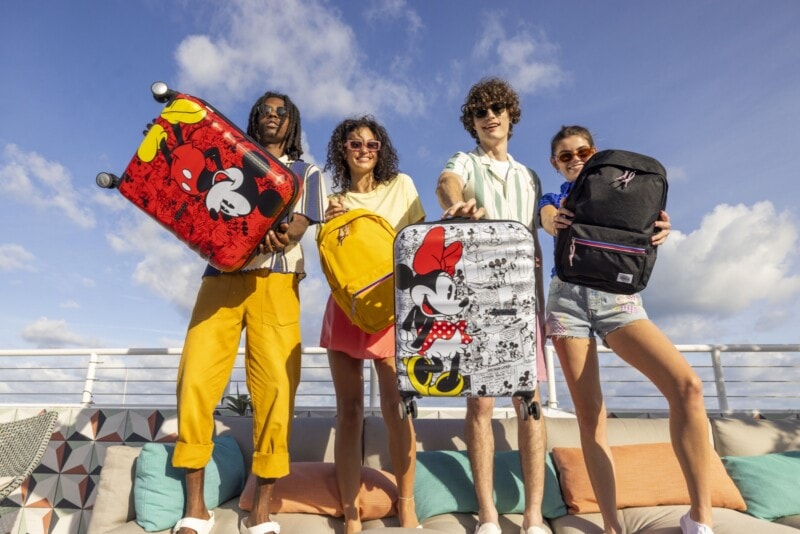
Honestly, my favorite thing about American Tourister is the fun designs. They’ve got kids carry-ons with Disney character prints, night sky patterns, and a huge checked bag printed with Mickey Mouse pants. Plus, their non-printed luggage comes with interesting textures and a huge range of colors.
This is not just about making a style statement; it’s practical, too.
Ever tried spotting your black bag among a sea of similar ones? It’s not fun. Imagine if you’ve got a giant print of Darth Vader on your suitcase, though. No way you’re going to miss that.
Of course, not everybody loves to be the center of attention. If you dislike bright, eye-catching colors on your luggage, Samsonite’s more conservative, minimalist designs will be more up your alley. Their luggage pieces are more dialed-in and sophisticated than anything from American Tourister, and their higher-end bags definitely don’t look like cheap products you picked up at Target.
Functionally, American Tourister suitcases are pretty simple and basic, and I honestly think that’s a good thing. When budget brands try to pack in too many features, you just end up with more things to break.
You’ll find zippered dividers, a few internal pockets to keep things organized, and adjustable telescoping handles. None of that is groundbreaking, but it gets the job done.
If you like having lots of pockets and compartments to keep things organized, you’ll like Samsonite much more than American Tourister. Some of their suitcases are still pretty simple, but others (like the Outline Pro) have innovative designs with multiple dividers and plenty of pockets for smaller items.
Samsonite luggage also has more bells and whistles. Built-in TSA locks, removable toiletry pouches, garment folders, and USB ports are common across Samsonite’s product line. I love that these little details are included, and they really made my traveling easier.
American Tourister only scored 7.3 for functionality, and Samsonite scored much higher at 8.9 on average.
Value for Your Money
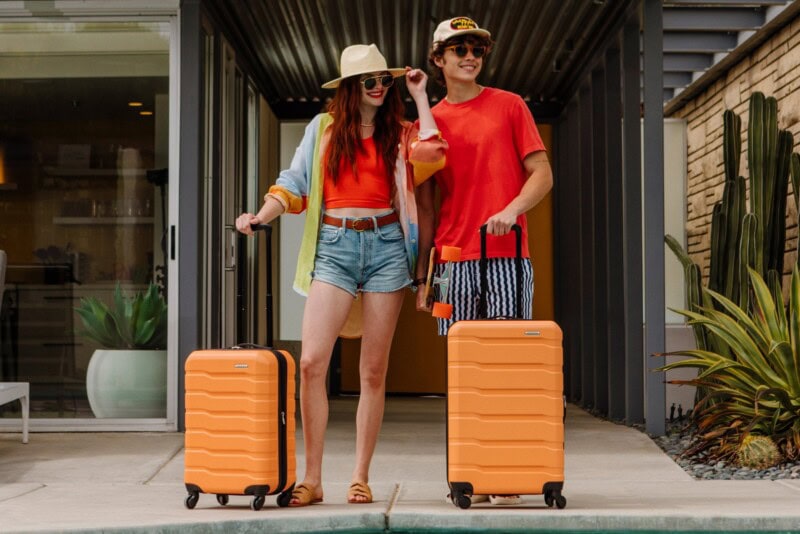
If you are strapped for cash and saving every penny for air travel, American Tourister sells some of the least expensive luggage on the market. They scored 10/10 for our Price-to-Performance category. Samsonite scored lower at 8.6.
American Tourister is one of the best luggage brands for ultra-cheap luggage, which makes it easier for you to buy your carry-on suitcase, pay for airfare, and still have some cash left over for travel accessories.
Of course, you shouldn’t expect the quality to be the same as higher-end brands. If you travel a lot, an American Tourister bag might not last very long, and having to replace it kind of defeats the purpose of saving money in the first place.
Samsonite suitcases do cost more, but they will also last longer.
If you just need a bag for occasional trips, American Tourister will be fine, but if you travel more frequently, you’ll save money in the long run by going with Samsonite.
Warranty and Buying Experience
Since both brands are owned by the same company, their warranties are pretty much identical. They even have the same wording on their warranty pages.
Most American Tourister and Samsonite suitcases come with a limited 10-year warranty. This definitely doesn’t compete with brands with full lifetime warranties like Travelpro or Briggs & Riley, but both American Tourister and Samsonite have a decent reputation for repairing or replacing suitcases on warranty.
That said, they specifically state that their warranty does not cover damage caused by normal wear and tear or airline baggage handlers, only manufacturing or material defects.
Of course, with American Tourister’s low costs, any sort of warranty is nice to have.
Brand Impact & Sustainability
If buying more sustainable products is important to you, the choice is simple. Samsonite is far ahead of American Tourister when it comes to brand impact and sustainability. Samsonite scored 6.2 for sustainability, while American Tourister only scored 4.5.
Samsonite uses recycled materials in its fabric bags, reports its carbon footprint, plans to use 100% renewable energy by 2025, and donates to environmental and social charities.
Final Thoughts
Even though Samsonite and American Tourister are owned by the same company, these two luggage brands are very different and they cater to different types of travelers.
Samsonite scored better than American Tourister in almost all of our testing metrics, and I think it’s pretty clear that they make better luggage overall. Samsonite brand suitcases are more durable and have more practical features and designs. For most travelers, Samsonite will be the better choice.
But that doesn’t mean there’s no reason to choose American Tourister.
One of those reasons is cost. American Tourister luggage is cheap, and if you watch out for deals, it can be really cheap. If you don’t travel frequently, American Tourister gives you better bang for your buck.
Another reason to buy American Tourister is if you just really want one of their fun print designs. I mean, it’s hard to say no to a Monster’s Inc. carry-on. If you are buying luggage for a child (or just for your own inner child), it’s hard to beat American Tourister.
So it comes down to this, are you a more serious frequent traveler who needs a reliable suitcase, or someone who travels less frequently and just wants a fun bag for those occasional getaway trips?
American Tourister vs. Samsonite FAQs
Can American Tourister luggage be used for frequent travel?
Yes, American Tourister luggage is designed to withstand the rigors of travel.
How does the warranty compare between American Tourister and Samsonite?
Samsonite typically offers longer and more comprehensive warranties, covering various defects and damages.
Are there any eco-friendly luggage options from these brands?
Samsonite has launched collections emphasizing environmental responsibility without compromising quality or durability.
Is American Tourister the same quality as Samsonite?
No, Samsonite offers higher-end materials and features, while American Tourister focuses on affordability.
Which suitcase brand is best?
It depends on your needs. Samsonite luggage offers quality and more features while American Tourister provides more budget-friendly options.
Does the weight of the suitcase matter?
Yes, a lighter suitcase means you can pack more without going over airline weight limits.
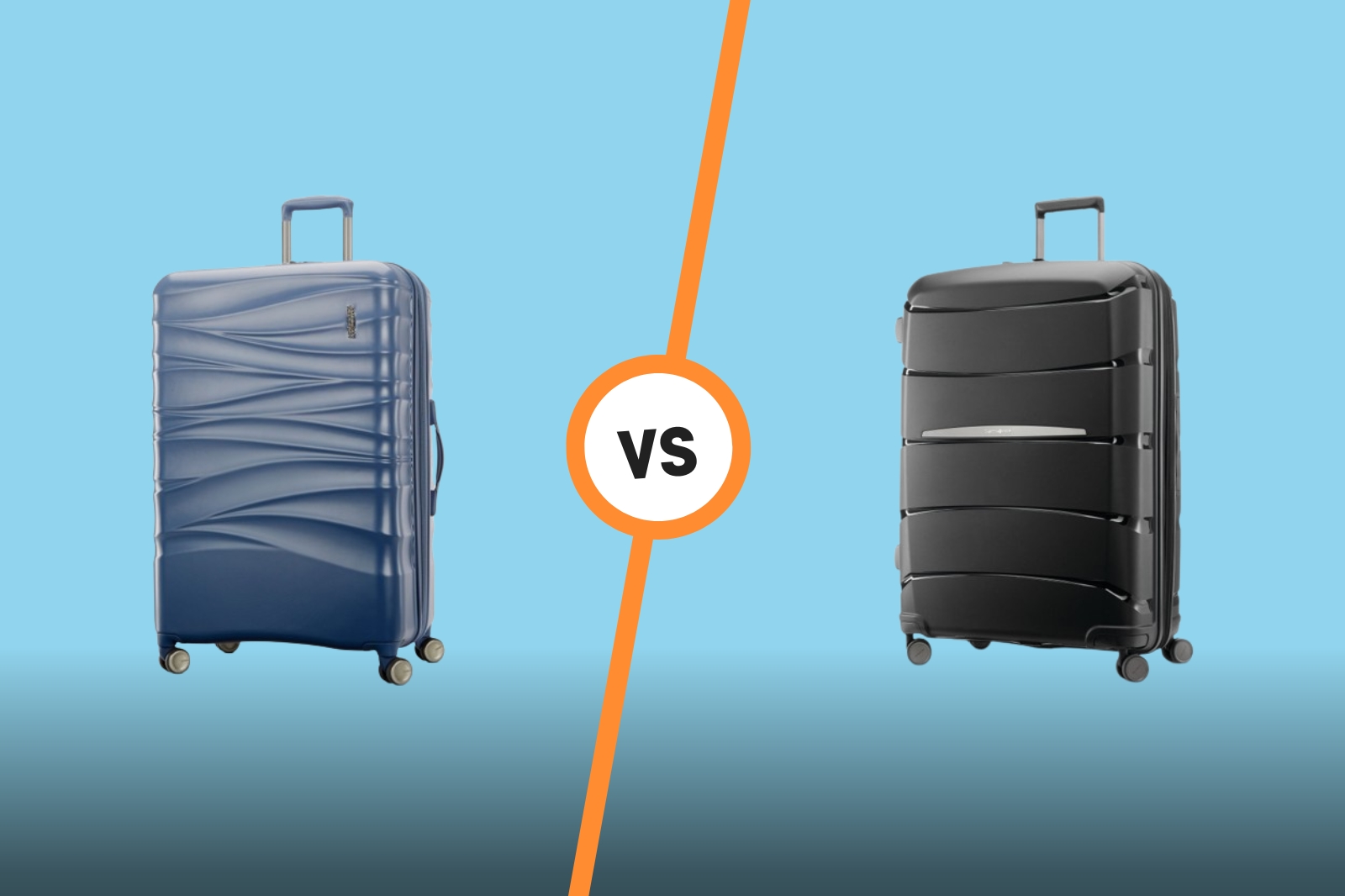




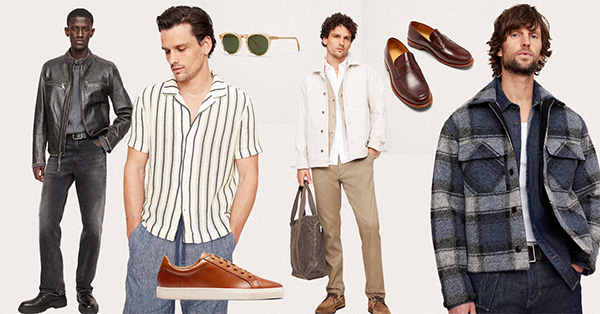


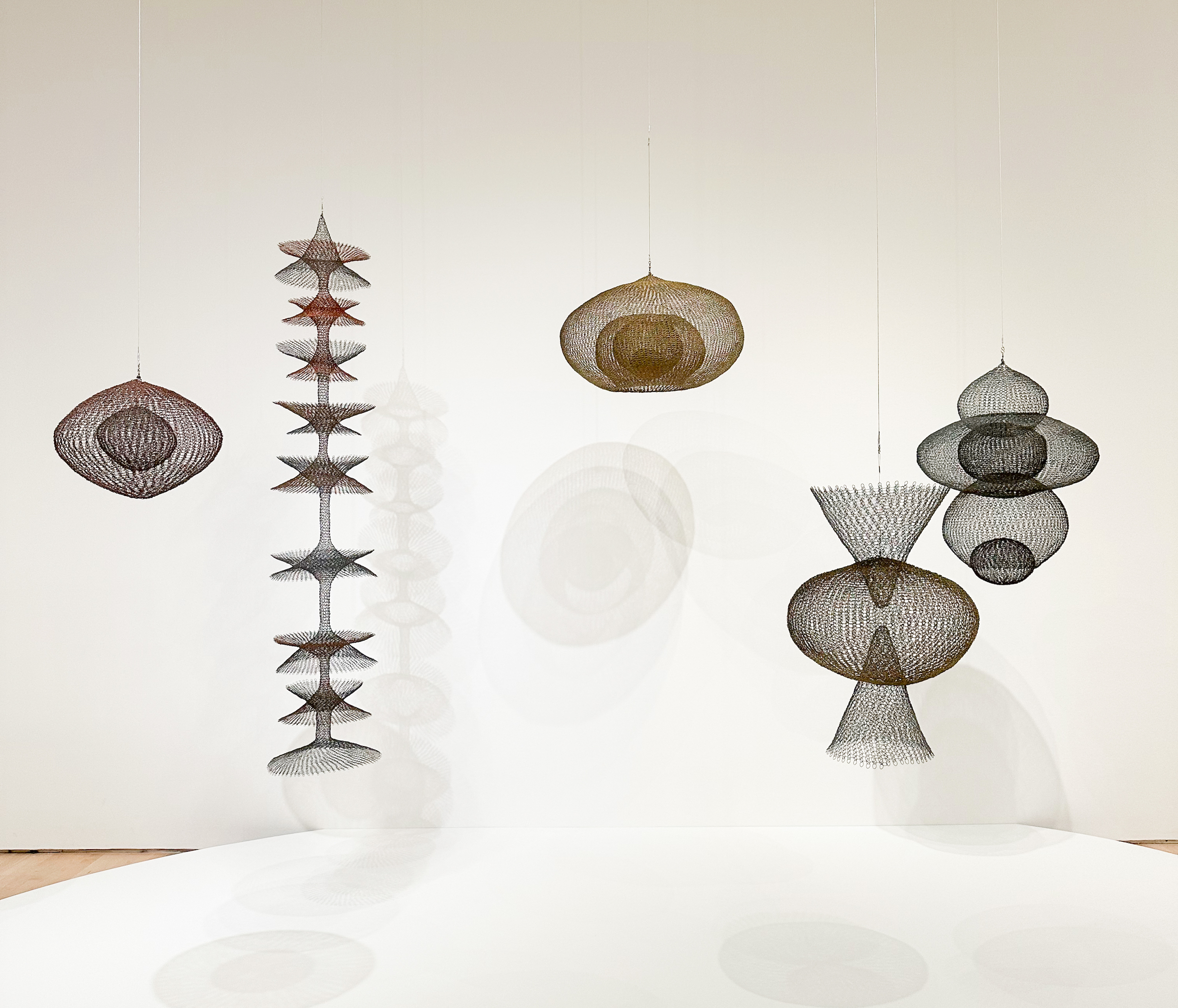
Leave a Reply